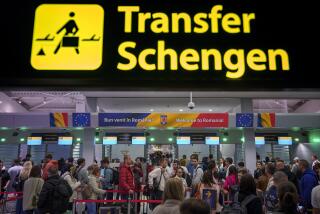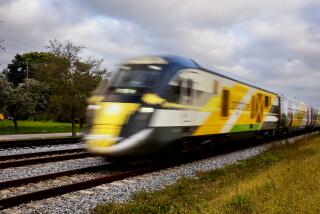Go native in Europe and Japan -- take the train
Who rides trains these days?
Europeans, for starters. And the Japanese, of course. And maybe you, if you’re looking to discover new places and save some money while you’re in Britain or Ireland, on the Continent or in Japan.
Rail passes, savvy travelers know, can give you entree to cities or towns you otherwise might not visit and can help you set your budget before you leave U.S. soil. There’s no more fumbling for the right currency as other riders wait behind you, no more stumbling around in a language that could have you arriving in Milan when you really wanted Bonn.
Europe
Rail Europe ([800] 622-8600, www.raileurope.com) has organized the region’s patchwork of rail lines with a comprehensive group of passes that let users crisscross the countryside, customize travel to adjoining countries or visit just a single nation.
North American residents must buy their passes before traveling to Europe.
A maze of pricing options reflects the class of service, age and number of passengers, geography, time of travel and number of days and whether they’re consecutive. Here are some of the plans:
The Global Pass, perhaps the simplest, is good for unlimited first-class travel on the rail networks of Austria, Belgium, Croatia, the Czech Republic, Denmark, Finland, France, Germany, Greece, the Netherlands, Hungary, Ireland, Italy, Luxembourg, Norway, Portugal, Romania, Slovenia, Spain, Sweden and Switzerland.
Cost: Prices start at $700 for 15 consecutive days, and $826 for 10 days within a two-month period.
The Eurail Select Pass is good for travel to three, four or five adjoining countries connected by train or ship. (Smaller countries such as Belgium, Luxembourg and the Netherlands, or Croatia and Slovenia, count as one.)
Cost: First-class unlimited travel within three countries starts at $443 for five days in a two-month period.
In general, prices for individual country passes are highest in Western and Northern Europe. Passes for smaller nations in the south and east cost less. For example, a pass good for three days of travel within one month costs $293 and $250 in France, $137 and $70 in Portugal, and $262 and $209 in Spain (valid for two months).
A BritRail pass (www.britrail.com), good for travel in England, Scotland and Wales, costs $395 for four consecutive travel days in first class, $259 in second class. A pass for four days within two months is $489 and $329, respectively. Off-season discounts apply.
In Ireland, a pass for five days of travel within one month costs $206 and is offered in second class only. The BritRail + Ireland pass covers five days of travel within two months in Ireland and Britain (including Northern Ireland) for $671 in first class, $454 in second class.
Because rail operators limit the number of seats on high-speed trains allocated to Rail Europe customers, a pass does not guarantee a seat even when a train is not sold out. Mandatory reservations (for an additional fee in most cases) may be made in person only in the country where travel originates.
To compare pricing, I navigated the flurry of options on the websites of Britain’s Virgin Rail ( www.virgintrains.co.uk), France’s SNCF (www.voyages-sncf.com), Italy’s Trenitalia ( www.ferroviedellostato.it), Spain’s Renfe ( www.renfe.es) and Switzerland’s SBB ( www.sbb.ch).
In each case, fares were about 20% less than those quoted on Rail Europe’s website, before the minimum $18 shipping fee.
But Rail Europe’s streamlined one-stop reservation in English simplifies the process. It avoids possible glitches with a credit card’s foreign billing or having to figure where to retrieve reservations at European train stations.
Japan
The Japan Railways pass ([212] 332-8686, www.japanrail.com) is available for both second (ordinary) and first-class (green) travel for trips of seven ($314 and $420), 14 ($500 and $680) and 21 days ($640 and $884).
JAL, ANA and other authorized travel agents (see website) sell the pass, in the form of vouchers, to foreign travelers or Japanese nationals living abroad. It must be purchased outside Japan.
Because it is priced in yen and sellers use different conversion conventions, the cost will vary. Pricing, however, is straightforward, with little seasonal variation and no round-trip or advance-purchase discounts.
Vouchers (called exchange orders) must be traded for actual JR passes once in Japan. Not all train stations process them. Ticket offices at the Narita (Tokyo) and Kansai (Osaka) airports are a convenient option.
The JR Pass is not valid on the multitude of private rail -- mostly commuter -- lines. Reservations for the high-speed Shinkansen trains are not necessary but can be made, for free, in person at any JR ticket office in Japan. Trains usually have unreserved cars. The pass is not valid on the fastest Nozomi service but is honored on the slightly slower Hikari trains.
More to Read
Sign up for The Wild
We’ll help you find the best places to hike, bike and run, as well as the perfect silent spots for meditation and yoga.
You may occasionally receive promotional content from the Los Angeles Times.






